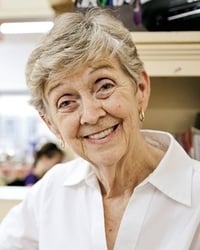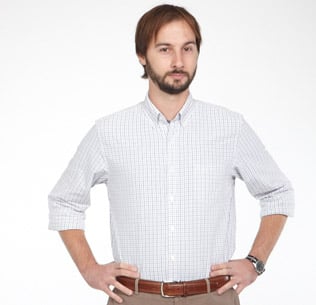
Sue Vass, 75
Montgomery County Thrift Shop
This packed store was founded toward the end of World War II, when a group of women who had collected tin cans for ammunition began to gather donated clothing for returning troops and others in need. It’s owned and operated by volunteers, with profits going to five local charities. Sue Vass started volunteering there in 1975.
Most interesting donation: Someone left this big box here one day, and inside was the most beautiful white wedding dress. At the very bottom was a set of wedding rings just sitting there. We almost missed them.
The secret to success: Prices. You can get a good-quality suit for $12 at a thrift shop. Even rich people sometimes come in. Everyone is looking for a bargain.
Most memorable moment: We were closing up and I saw a wadded-up Kleenex on the floor. Inside was a roll of $100 and $50 bills tied with a rubber band. It came out to $1,000. We held onto it knowing whoever it belonged to was going to come back. And sure enough, this lady comes in looking really nervous. She said she might’ve dropped some money that she was carrying in her bra. She said it was her mortgage payment. I said, “You don’t believe in putting money in the bank?” Just to be sure, I asked her to describe the bills and how many of each she had, and she got it bill for bill. I gave the money back to her, and she hugged every single person in that store. That was just before Christmas.
—–
Terry Fortuna, 75
Fortuna’s
Terry Fortuna took over this shoe-and-luggage-repair store in 1984 from her father-in-law, Joseph Fortuna. Joseph had opened the store in 1938 after learning the craft of shoe repair from his father, a shoemaker from Italy.
How shoes have changed: Washington was always considered a very conservative town for women’s fashion, but now they’re wearing Jimmy Choo and Louis Vuitton. Men’s shoes wear out much faster. I’ve learned that the more expensive a shoe is, the more delicate it is. A pair of Skechers will last like iron.
Best compliment from a customer: A woman brought in a purple patent-leather purse and it looked terrible. I told her it wasn’t worth fixing. She said her daughter had given it to her as a gift and every time she used it, it made her think of her. That daughter had passed away. I told her I would try my best. We ended up buying three shades of purple leather, hoping one of them would work, and we put a tremendous amount of effort into making it look good. When she came to pick it up, she cried.
Advice for a new business: Have enough money in the bank to survive for six months with no business. I’ve watched a lot of people open up around me and close five months later. If you can’t smile and offer good food or good service every day for at least six months, you shouldn’t start a business
—–
Tom Merkel, 60
Bradley Food & Beverage
Merkel was just shy of his 21st birthday when he started working at Bradley Food & Beverage. His only experience in the food industry was summer jobs at pizza and sandwich shops, but he saw potential in the gourmet-food market. Thirty-nine years later, he owns the store and works alongside his wife, Charleen.
How Bethesda has changed: Way back in the day, there was East-West Highway, Old Georgetown Road, and Wisconsin Avenue, and that was pretty much it. There was a Peoples drugstore, a post office, a couple banks, and a movie theater. The coming of the Metro in 1984 really started it all.
The secret to success: Staying involved in the day-to-day work. I still work behind the counter and make sure what I’m handing to the customer is what I want to serve.
Advice for a new business:Expect the unexpected, and be prepared. There was a time when a Giant or Safeway wouldn’t carry prosciutto or even have a full deli, but now every place has gourmet food. It’s friendly, personal service that keeps us ahead of the curve.
—–
Barbara Johnson, 85
Montgomery Farm Women’s Cooperative Market
This busy Wisconsin Avenue farmers market started in 1932. Barbara Johnson has been operating her vegetable stand here for more than 50 years and became president of the market nearly two decades ago.
How the market has changed: When I started, we used big buckets of ice to keep things cold—and nobody got sick. Now everything has to be refrigerated and the health inspectors come to check the temperature. In the 1960s, all of the women working had to wear white uniforms and hairnets. They thought it was more ladylike.
The younger generation doesn’t buy what the older generation used to. Younger people don’t know how to cook greens like kale and spinach. So they buy things like tomatoes and lettuce. Most everybody knows how to make a salad.
How Bethesda has changed: It used to be nothing but the regular stores—the dime store, the corner store, the bodega. Now we have restaurants on every side of us. They didn’t have any high-rises back then, either. They all shot up overnight.
What makes the market unique: The history. People appreciate the story behind this place and how it’s still here. The customers, too—lots of them have been coming for years. Now their children and grandchildren do.
This article appears in the September 2011 issue of The Washingtonian.
















